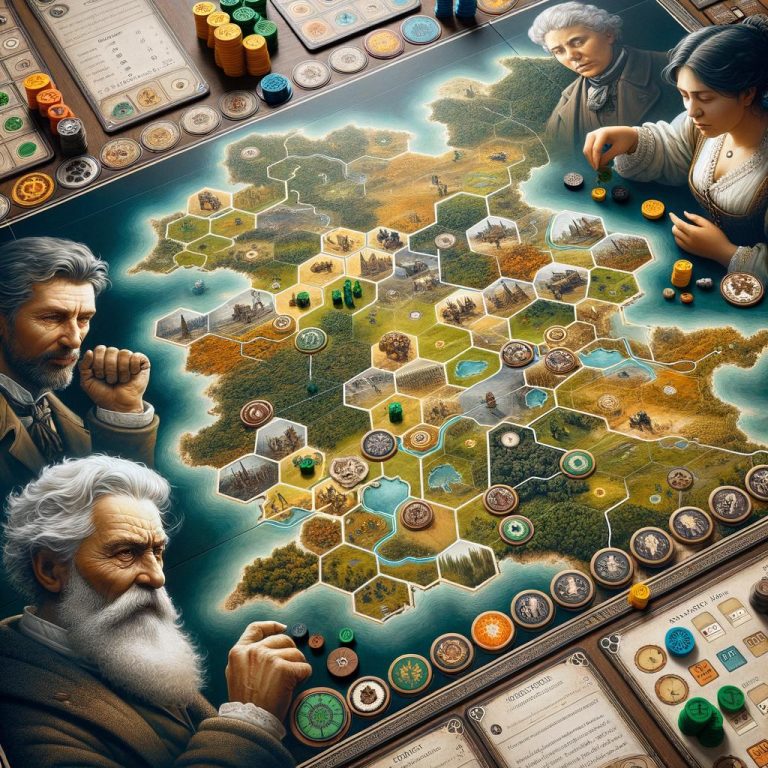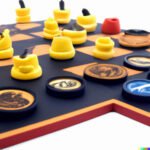Have you ever wondered how to dominate in the popular Scythe board game? With its intricate gameplay and diverse factions, mastering a winning strategy can be challenging yet rewarding. In this guide, we will delve into the world of Scythe and explore key strategies to help you conquer the game. Whether you’re a beginner looking to improve your skills or a seasoned player seeking new tactics, understanding the nuances of Scythe is essential for achieving victory.
Scythe is a strategic board game set in an alternate-history 1920s Europe, where players compete as factions vying for control over the land using powerful mechs. Each faction has unique abilities and starting resources, making it crucial to choose one that aligns with your playstyle.
Learning the basics of Scythe, from movement and resource management to combat mechanics, is vital for developing a solid foundation in the game. By honing these fundamental skills, players can set themselves up for success and plan their strategies accordingly.
As you progress in Scythe, mastering advanced strategies becomes essential for outwitting your opponents and claiming victory. From optimizing your economy and resources to engaging in strategic combat and encounters, every decision plays a crucial role in shaping the outcome of the game.
By understanding player mats, actions, and faction strengths, players can effectively build their empire and secure their path to success on the battlefield. Stay tuned as we delve deeper into these strategies and offer tips for beginners to avoid common pitfalls along the way.
Learning the Basics of Scythe
Scythe is a board game that combines elements of resource management, area control, and strategic combat. To begin learning the basics of Scythe, players must first understand the game board and how it is divided into different territories.
Each territory provides resources such as food, metal, oil, wood, and grain that are essential for building mechs, structures, and recruiting workers. By strategically positioning their characters on the board to collect these resources efficiently, players can lay a solid foundation for their overall strategy.
In addition to gathering resources, players must also focus on increasing their power and popularity levels. Power is crucial for upgrading mechs and moving characters across the board quickly, while popularity impacts the number of new recruits a player can gain each turn. Balancing these two aspects is key to success in Scythe as they directly influence a player’s ability to execute their chosen strategy effectively.
One essential aspect of learning the basics of Scythe is understanding how movement works in the game. Players must navigate the board using character abilities and upgrades to maximize their efficiency in resource collection and combat encounters. By mastering movement strategies early on, players can set themselves up for success in later stages of the game when competition for territories and resources intensifies.
| Resources | Strategy Tips |
|---|---|
| Food | Focus on upgrading mechs early to improve efficiency |
| Metal | Plan your movements ahead to secure key territories |
| Oil | Balance power and popularity levels effectively |
Choosing the Right Faction for Your Playstyle
When it comes to playing Scythe, one of the most crucial decisions you’ll make is choosing the right faction that matches your playstyle. Each faction in the game has its own unique abilities and starting resources that can greatly impact your strategy throughout the game. Understanding how each faction works will help you make an informed decision on which one to choose.
Understanding Faction Abilities
Before selecting a faction, take the time to read and understand their special ability. Some factions may excel at producing resources while others may have advantages in combat or movement. Choose a faction whose abilities align with your preferred style of gameplay. For example, if you prefer a more aggressive approach, a faction with strong combat abilities might be ideal for you.
Starting Resources and Location
Another important factor to consider when choosing a faction is their starting resources and location on the board. Some factions may start with more coins or power, giving them an early advantage in building mechs or upgrading buildings. Additionally, consider where your faction starts on the board in relation to key resources and encounters. Choosing a faction that starts in a favorable location can help you establish a strong economy early on.
Overall, when selecting a faction in Scythe, it’s essential to consider how their abilities and starting resources align with your strategic goals. By choosing a faction that complements your playstyle, you’ll be better equipped to execute your game plan and compete for victory. Remember that experimenting with different factions is also part of the fun of Scythe, so don’t be afraid to try out new strategies and discover which faction works best for you.
Understanding the Player Mats and Actions
Scythe is a complex board game that requires players to understand the player mats and actions in order to succeed. Each player mat represents a unique faction in the game, with different starting resources, abilities, and combat strengths. It is crucial to choose the right faction that aligns with your playstyle and strategy for victory.
Once you have selected your faction, it is important to familiarize yourself with the actions available on your player mat. These actions are essential for developing your resources, economy, and military strength throughout the game. Understanding how each action can benefit your overall strategy will give you an advantage over your opponents.
One key aspect of mastering the player mats and actions in Scythe is efficient planning. By strategically utilizing each action on your player mat, you can optimize your turns and maximize your resource production. Balancing between expanding your territories, upgrading your abilities, and engaging in combat will be crucial for achieving victory in the game.
| Scythe Board Game Strategy | Player Mats and Actions |
|---|---|
| Choosing the right faction | Understanding available actions |
| Efficient planning for success | Optimizing turns for maximum output |
Developing Your Resources and Economy
As you delve deeper into the world of Scythe board game strategy, it becomes vital to focus on developing your resources and economy. In order to thrive and dominate in this competitive game, carefully managing your resources is key. Resources like food, wood, metal, oil, and popularity are essential for building structures, recruiting mechs, upgrading abilities, and conquering territories.
One important aspect to consider when developing your resources is maximizing efficiency. This involves planning ahead for future turns and making strategic decisions that will benefit you in the long run. It’s crucial to balance acquiring different types of resources to ensure you have what you need to progress in the game. Keep an eye on your opponents’ moves as well, as competition for resources can be fierce.
Additionally, focusing on bolstering your economy is crucial for success in Scythe. Building structures that provide ongoing benefits or generate resources can give you a significant advantage over your opponents. Upgrading your player mat abilities related to production can also help increase your resource output.
Remember to adapt your strategies based on the faction you choose and leverage their unique strengths to enhance your resource-gathering capabilities. By developing a strong economy early on, you set yourself up for a powerful position as the game progresses.
Mastering Combat and Encounters
Combat and encounters play a crucial role in the strategic gameplay of Scythe. Understanding how to effectively navigate these aspects of the game can greatly improve your chances of success. Here are some tips and strategies to help you master combat and encounters in Scythe:
1. Evaluate Your Strengths and Weaknesses: Before engaging in combat or encounters, assess your faction’s strengths and weaknesses. Consider factors such as your current combat power, resources, territory control, and the abilities of your units. This will help you make informed decisions on when to engage in combat and when to avoid it.
2. Strategic Positioning: Proper positioning of your units on the board can give you a significant advantage during combat. Consider the movement capabilities of different units, terrain bonuses, and proximity to resources or objectives. By strategically placing your units, you can control key areas of the board and outmaneuver your opponents.
3. Utilize Encounters Wisely: Encounters can provide valuable rewards such as resources, coins, or upgrades for your faction. However, they also come with risks that could potentially set you back if not managed carefully. When choosing which encounters to pursue, weigh the potential benefits against the drawbacks and plan accordingly.
By incorporating these strategies into your gameplay, you can enhance your ability to succeed in combat and encounters in Scythe. Remember that adaptability and flexibility are key components of a successful strategy in this game. Stay mindful of your opponent’s moves, anticipate their actions, and leverage your faction’s unique strengths to secure victory on the board.
Overall, mastering combat and encounters requires a combination of tactical decision-making, resource management, and risk assessment. By honing these skills and staying attuned to the dynamics of each game scenario, you can increase your odds of emerging victorious in the world of Scythe board game strategy”.
Advanced Strategies for Victory
Utilizing Multiple Paths to Victory
One key aspect of a successful Scythe board game strategy is the ability to pursue multiple paths to victory simultaneously. While focusing on one specific aspect, such as military might or resource production, can be effective, it’s often beneficial to diversify your approach. By balancing your efforts across different areas like expanding territories, upgrading mechs, and completing objectives, you increase your chances of securing victory on multiple fronts.
Adapting to Your Opponents
In a game as dynamic as Scythe, it’s crucial to adapt your strategy based on the actions of your opponents. Pay close attention to their moves and adjust your plans accordingly. If a rival faction seems to be prioritizing military strength, consider bolstering your defenses or forming alliances with others to protect yourself. Likewise, if an opponent is racing ahead in terms of resources or territory control, find ways to disrupt their plans and level the playing field.
Timing Is Everything
Mastering the art of timing is another essential element in achieving victory in Scythe. Knowing when to capitalize on opportunities, such as claiming key territories or engaging in combat with weakened opponents, can make a significant difference in the outcome of the game.
Be patient when necessary but also be willing to act decisively at critical moments. Developing a keen sense of timing will give you a competitive edge and increase your chances of success in this intricate and strategic board game.
By incorporating these advanced strategies into your gameplay, you can enhance your performance and boost your chances of emerging victorious in the challenging world of Scythe. Remember that every decision matters and each move plays a part in shaping the outcome of the game. Stay flexible, observant, and proactive in your approach, and you’ll be well on your way to mastering this captivating board game experience.
Tips for Beginners and Common Mistakes to Avoid
Scythe is a popular board game that combines elements of strategy, resource management, and combat in an alternate history 1920s Europe. While mastering the game may take some time and practice, there are some tips for beginners to help them get started on the right foot and avoid common pitfalls.
Here are some tips for beginners to keep in mind while playing Scythe:
- Focus on expanding your territory early in the game to secure valuable resources and control key areas of the board.
- Pay attention to your opponents’ strategies and adjust your own tactics accordingly. Adaptability is key to success in Scythe.
- Don’t neglect your economy – upgrading your technology tracks and producing resources efficiently will give you a significant advantage in the later stages of the game.
In addition to these tips, it’s important to be aware of common mistakes that beginners often make when playing Scythe. By avoiding these pitfalls, you can improve your chances of success and develop a winning strategy:
- Avoid spreading yourself too thin – focus on a few key objectives rather than trying to do everything at once.
- Don’t neglect combat – while peaceful expansion can be effective, engaging in combat when necessary can yield valuable rewards and help prevent aggressive opponents from gaining too much power.
- Keep an eye on the popularity track – neglecting popularity can result in losing valuable points at the end of the game, so make sure to maintain a balance between military strength and civilian support.
By keeping these tips in mind and steering clear of common mistakes, beginners can improve their gameplay experience and increase their chances of implementing a winning Scythe board game strategy. With practice and strategic thinking, players can become more proficient at navigating the complexities of Scythe and emerge victorious in this engrossing board game.
Conclusion
In conclusion, developing a winning Scythe board game strategy requires a combination of careful planning, resource management, and strategic decision-making. By understanding the basics of the game, choosing the right faction that suits your playstyle, mastering combat mechanics, and utilizing your player mats efficiently, you can increase your chances of victory.
One crucial aspect of success in Scythe is to focus on developing your resources and economy throughout the game. By optimizing resource production and upgrading buildings to generate income, you will have more flexibility in taking actions and gaining advantages over your opponents. It is essential to strike a balance between expanding your territory, bolstering your military strength, and advancing on the popularity track to secure victory points.
Additionally, as you progress in mastering the game mechanics and strategies, experimenting with different approaches and tactics can help enhance your gameplay. Whether you prefer aggressive military tactics or peaceful economic development, adapting to changing circumstances on the board and adjusting your strategy accordingly will be key to achieving success in Scythe.
Remember to stay adaptable, pay attention to your opponents’ moves, and always strive to maximize efficiency in order to emerge victorious in this engaging and competitive board game experience.
Frequently Asked Questions
How Do You Win Scythe Board Game?
Winning the Scythe board game requires a strategic approach that involves balancing different aspects of gameplay such as economy, military power, and controlling territories efficiently. Players need to focus on their unique faction abilities and objectives while adapting to their opponents’ strategies.
How Do You Play Scythe Better?
Playing Scythe better involves understanding the strengths and weaknesses of your chosen faction, optimizing your actions each turn to achieve your goals, and managing resources effectively. It is essential to pay attention to the board state, anticipate opponents’ moves, and utilize upgrades and abilities strategically to gain an advantage.
How Hard Is Scythe Board Game?
The difficulty level of the Scythe board game can vary depending on players’ experience with similar strategy games and their understanding of the game mechanics. While it may seem challenging at first due to its intricate gameplay elements, repeated plays can help familiarize players with the rules and strategies required to master the game.
With time and practice, players can find Scythe less difficult as they become more skilled at decision-making and tactical planning.

I love playing all kinds of games – from classics like Monopoly to modern favourites like Ticket to Ride.
I created this blog as a way to share my love of board games with others, and provide information on the latest releases and news in the industry.





